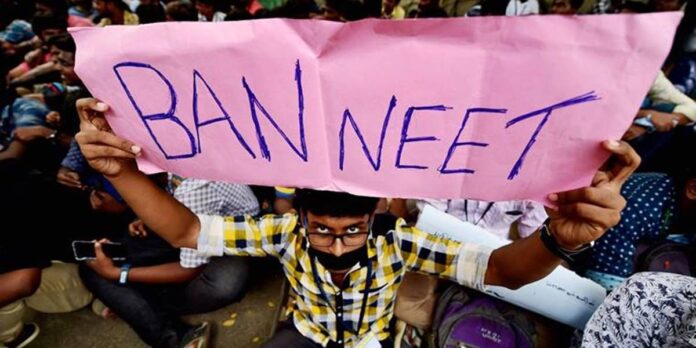Recently, the All India Federation of OBC Employees Welfare Association, a body representing the OBC community released a report in regard to the annually conducted medical entrance exam NEET. The report pointed out that 11,027 NEET aspirants from the OBC community were deprived of the admission process in the last four years because of the BJP Government’s dillydallying implementation of OBC reservations. This expose brought back the debate surrounding the Brahmanical nature of present Government and its repeated attack upon reservation and undermining of social justice since it came to power in 2014.
This particular case of NEET exam should not be seen in isolation from other incidents of attack upon social justice, which includes the introduction of EWS quota or the recent decision by Supreme Court which absolved the State from implementing reservation in appointment and promotion to public posts. Previously the Supreme Court had absolved itself from any responsibility of directing states to reserve jobs of positions for SC and ST community. Every time the BJP government pushes any anti-reservation policy, it is criticized for its Brahminical nature, and rightly so. It is true that the character of BJP government is Brahminical. Destroying reservation in Higher education and employment is one of the topmost priority for the Hindutva family. Top Hindutva leaders have repeatedly expressed their disdain for the system of reservation and have called for ending it, which they perceive as ‘injustice towards the upper-caste’.
The current version of Identity politics might save principle of reservation and representation in the political-electoral sphere, but it will certainly not be able to save and ensure social justice because neo-liberalism has become common sense across mainstream parties and politicians and the parliament is slowly but steadily abandoning its control over economic sphere.
But, this sustained attack on the system of reservation cannot be simply understood as an outcome of Brahminical ideology. We will also have to take into consideration the economic ideology/rationality which has become the guiding principle for organizing and imagining society in present times, that is, Neo-liberalism. It must be acknowledged that the principle and politics of Social Justice, of which reservation is just a part, has been under attack not only in India but globally which can be traced back to the early 1980’s.
Multi-Pronged Neoliberal Attack on Social Justice:
The Neo-liberal attack on Social Justice is multi-pronged. The principle of Social Justice is based upon the idea that there are some groups in society (based on caste, race, gender, ethnicity and religion etc.) which are historically oppressed and consequently marginalized. Their socio-economic-cultural conditions prevents them from access to resources necessary for equitable participation in growth story of any society. In order to achieve comprehensive and overall equitable growth of society in social, cultural and economic realms, the sources of structural inequalities have to be removed in which State will have to play an important role through policy formation directed at upliftment of marginalized communities. Also, since structural inequalities prevent historically marginalized from participating in political process, their representation must be ensured through special measures. Thus, State plays a very important role in ensuring Social justice.
Firstly, in matters of principle, the neo-liberal worldview is exact opposite of principle of Social justice. Neo-liberalism does not believes in the existence of any structural inequality. It believes that opportunities are equally available for everyone, irrespective of their social location and therefore one should not demand any special ‘privilege’ from the Government, because that leads to inequality of opportunities. In order to justify this logic Neo-liberalism glorifies the concept of ‘merit’ and ‘competition’ and argues that one is responsible for one’s own fate and their failure is an outcome of laziness and lack of activity and effort. From the neo-liberal perspective, someone born in a Dalit family engaged in manual scavenging is equal to someone born in a so called upper-caste family which owns a multi-million business. This might seem to be an extreme contrast, but this is what Neo-liberalism believes.
Secondly, the Neo-liberal thought argues that the role of State in economy and society should be reduced to minimum. It argues that collective demands made by interest-groups distorts the market and roadblocks economic growth and therefore it is against any kind of State intervention on behalf of people. In its incessant attack on the State intervention in economy, Neo-liberalism also indirectly undermines the principle of Social justice. From the Neo-liberal perspective, policies of reservation or affirmative action is seen as tilting the balance in favour of those communities who exercise them thereby perpetrating ‘injustice’ and ‘violence’ towards others.
Thirdly, in continuation with Neo-liberalism’s demand for roll-back of the State is its’ constant push for privatization, curtailment of welfare schemes and commodification of rights. Important sectors like health and education which have been considered hitherto as citizen Rights and are ensured by the State, are imagined as commodities under neo-liberalism. If one wishes to access quality education and health, they have to buy it from the market because State continues to diminish its role from these important sectors. In the neo-liberal worldview the size of pocket determines whether a person will have access to quality health, education and even portable water, food and electricity, which are defined as desires instead as basic necessity and rights under neo-liberal worldview.
For the Neo-liberals, equality is just an abstract concept and therefore they do not recognise Social Justice. Prominent Neo-liberal thinkers like the Nobel winner Austrian economist Friedrich Von Hayek came down heavily upon the concept of social justice and called it meaningless, self-contradictory, non-sense and threat to liberty. Similarly, Milton Friedman, another Noble winning economist and father of contemporary Neo-liberalism heavily criticized the principle of Social justice and called it a threat to freedom. For the Neo-liberals, Social justice is a relic from the era of socialism and planned economy and therefore has to be discarded in totality. It is considered as an ideological nemesis.
Similarities with Brahminism:
It is true that contemporary Brahmanism and Neo-liberalism share many affinities. Both believe in an abstract concept of ‘equality’, do not recognize structural inequalities, and put forward the logic of merit and competition while attacking the principle of social justice. Therefore, we must recognize that attack upon Social Justice in an outcome of both Brahmanism as well as economic policies of the present regime.
To a large extent, Social Justice depends upon the balance of power between classes in any society. In recent times, the Capitalist class has grown powerful at the expense of the working class and consequently the State is acting on behalf of the Capitalist class by constantly pushing privatization and withdrawing from social welfare. Since in its current form the reservation policy, by law cannot be applied in the private sector and the Brahminical legislature-judicial system will not allow for it, Social Justice will become meaningless as privatization and corporatisation engulfs more and more sectors of economy and society.
Also, the present Government has nothing but made a mockery of principle of representation by inducting many leaders from historically marginalized ST, SC and OBC communities in its ruling structure. Though the recent cabinet reshuffle has been done in light of the upcoming Uttar Pradesh assembly elections, it also shows the limits of identity politics divorced from working class ideology. Those leaders elected from the marginalized communities might speak against the Brahminical culture prevalent in the Hindutva family or demand construction of statues for their community icons, but they surely are not poised to resist the privatization hyper-drive of the present government.
The current version of Identity politics might save principle of reservation and representation in the political-electoral sphere, but it will certainly not be able to save and ensure social justice because neo-liberalism has become common sense across mainstream parties and politicians and the parliament is slowly but steadily abandoning its control over economic sphere.
Therefore it must be realised that only by strengthening the working class movement can the principles of social justice be saved. Only by reclaiming the State from the clutches of ruling class will ensure social justice in both short and long term.
Harshvardhan is currently pursuing PhD in Sociology at JNU.
Read: Sarpatta Parambarai: What packs the punch?






























